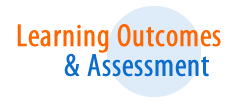Outcomes for the M.B.A. Program

Goals:
- Servant Leadership – to “possess the ability to change hearts, heal divisions and build community while
displaying virtues of courage, foresight, empathy and stewardship of the common good.”
Learn more about Servant Leadership»
Learning ObjectivesStudents will be able to:
- Work collaboratively (in person and virtually) within and across multi-functional/cultural groups to maximize team effectiveness in achieving shared goals.
- Identify and utilize individual strengths and skills and provide and receive feedback to enable the teamwork process.
- Students will be able to set direction, plan, organize and execute while creating a positive culture among team members to work towards a common goal/desired outcome.
- Identify ways in which business can be used as an engine for social and environmental change.
- Analyze and demonstrate understanding of juxtaposition of risk and ethics in business
situation/organization.
- Functional Knowledge of Business Enterprises – Students will have the ability to apply functional and cross-functional business
knowledge in an integrative manner.
Learning ObjectivesStudents will be able to:
- Demonstrate a fundamental understanding of functional areas in business including accounting; economics, data analytics; finance; information technology; law; management and marketing.
- Apply functional business knowledge in an integrative manner to effectively develop
solutions for business enterprises.
- Analytical and Critical Thinking – Students will have the ability to apply critical thinking and analysis skills in complex
business situations/problems.
Learning ObjectivesStudents will be able to:
- Select and apply appropriate qualitative and quantitative analytical tools and technology platforms to make business decisions while clearly identifying the assumptions and limitations of the analyses.
- Students will be able to effectively use data to indentify patterns and predictive strategies.
- Articulate and justify appropriate and reasonable solutions to complex business issues.
- Global Awareness – Students will have the ability to anticipate, identify, and respond to changes in
global environments and articulate how to strategically leverage international opportunities.
Learning ObjectivesStudents will be able to:
- Recognize and critically analyze the contribution and interdependencies of the cultural, political, economic, and legal domains in managing international business.
- Identify appropriate market information and sources on relevant issues and cultural norms necessary to conducting business globally.
- Evaluate and articulate how to leverage the opportunities and manage the risks associated
with managing international business when examining multi-national strategies.
- Communication – Students will have the ability to effectively and persuasively communicate in a
wide variety of business settings with diverse audiences.
Learning ObjectivesStudents will be able to:
- Write business documents that are concise, clear, and persuasive.
- Make effective oral presentations in a persuasive manner that acknowledges and respects the diversity and interests of audiences.
- Demonstrate effective use of advanced technology communications tools appropriate to business settings.

